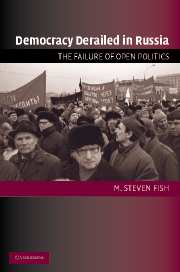Book contents
- Frontmatter
- Contents
- List of Figures and Tables
- Acknowledgments
- Abbreviations
- 1 INTRODUCTION
- 2 SOME CONCEPTS AND THEIR APPLICATION TO RUSSIA
- 3 SYMPTOMS OF THE FAILURE OF DEMOCRACY
- 4 THE RUSSIAN CONDITION IN GLOBAL PERSPECTIVE
- 5 THE STRUCTURAL PROBLEM: GREASE AND GLITTER
- 6 THE POLICY PROBLEM: ECONOMIC STATISM
- 7 THE INSTITUTIONAL PROBLEM: SUPERPRESIDENTIALISM
- 8 CAN DEMOCRACY GET BACK ON TRACK?
- References
- Index
- Titles in the series
3 - SYMPTOMS OF THE FAILURE OF DEMOCRACY
Published online by Cambridge University Press: 05 September 2012
- Frontmatter
- Contents
- List of Figures and Tables
- Acknowledgments
- Abbreviations
- 1 INTRODUCTION
- 2 SOME CONCEPTS AND THEIR APPLICATION TO RUSSIA
- 3 SYMPTOMS OF THE FAILURE OF DEMOCRACY
- 4 THE RUSSIAN CONDITION IN GLOBAL PERSPECTIVE
- 5 THE STRUCTURAL PROBLEM: GREASE AND GLITTER
- 6 THE POLICY PROBLEM: ECONOMIC STATISM
- 7 THE INSTITUTIONAL PROBLEM: SUPERPRESIDENTIALISM
- 8 CAN DEMOCRACY GET BACK ON TRACK?
- References
- Index
- Titles in the series
Summary
Our local electronic media here are completely under the sway of the administration. The government controls what's aired. And the electoral commission – that's under the administration's control too. We're on the Putin model here.
– Viktor Ostrenko, staff director, Center for Social Development “Vozrozhdenie” (an NGO dedicated to democracy promotion), Pskov, July 11, 2001Putin is no enemy of free speech. He simply finds absurd the idea that somebody has the right to criticize him publicly.
– Ksenia Ponomareva, deputy chief of Vladimir Putin's presidential campaign staff in 1999–2000, March 26, 2001 (reported in the St. Petersburg Times, March 27, 2001)Russia held four elections for parliament and three elections for president between 1993 and 2004. Elections have been carried out on a regular basis for officials at subnational levels. Control over government is constitutionally vested in elected officials, which means that Russia satisfies Robert Dahl's first criterion for polyarchy.
Dahl's other six criteria specify the conditions that ensure that election results express popular preferences. None of these other conditions is met in Russia. Dahl's second and third criteria specify that “elected officials are chosen in frequently and fairly conducted elections in which coercion is comparatively uncommon” and that “practically all adults have the right to vote in the election of officials.” In practice, elections are carried out frequently and at regular intervals, but they are not conducted fairly and coercion is common.
- Type
- Chapter
- Information
- Democracy Derailed in RussiaThe Failure of Open Politics, pp. 30 - 81Publisher: Cambridge University PressPrint publication year: 2005

